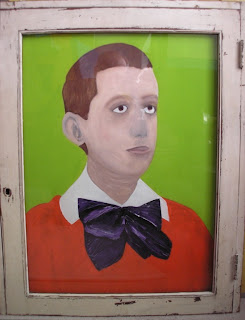Having learnt of Deanna Durbin's death (yesterday, april 20th), something immediately comes to mind (to memory): this little movie Every Sunday. A legendary tiny musical piece released in 1936, in which Deanna (then 14) played alongside Judy Garland (13).
That year the two girls were under contract by MGM, arguably the classiest Hollywood studio at the time. But the studio executives thought it was perhaps not entirely reasonable having two little girl singers in stand by, that is, two possible or potential stars in the making, being of the same profile. So, in theory, only one of them should be kept. But which one? Not an easy decision to make, given the undeniable talent of both.
Every Sunday was to decide. This short movie, of little more than 10 minutes, was to serve as a kind of screen test to evaluate Judy and Deanna, sort of to establish which one was the "better", or rather the better for the studio's purposes. The two girls' quite different singing styles are on display on Every Sunday. Deanna's operatic voice (like that of a "miniature diva" so to speak) versus the more "natural"/"pop", more of the jazz baby type, of Judy's. Well, finally, perhaps surprisingly, Deanna was the one MGM decided to let go. They would be keeping Judy.
Deanna and Judy, Judy and Deanna
14 year-old Judy, already full as she was of complexes and insecurities (and in a way always would be), in spite of her enormous talent, could not help wondering why exactly she had been the one the studio decided to retain. Judy, "the ugly duckling" or the "little hunchback", as Meyer supposedly once called her. In theory Deanna was the "better looking" of the two, with more glamorous potential. At least it was so in 1936, a few years before Judy would receive. her too (in 1942-43), the glamour treatment, which would turn her into one of the most beautiful creatures to have ever appeared on a movie screen. At least for a handful of years. Before (prescription) drugs and alcohol started eating up her liver.
After leaving the MGM, Deanna started a very successful career with Universal, her new studio. This of course left the ever insecure Judy wondering even more obsessively why she had been chosen over Deanna. Also with Universal, Deanna was to have leading roles almost straight away, while Judy on her part would not get her first adult/leading role until 1942. Only after having been the supporting girl of big box office draw Mickey Rooney in no less than seven movies, between 1937 and 1941. So for a while it was Deanna who appeared to be the "successful" one after all, despite her dropping by MGM, Then Oz came along to Judy. And Vincente Minnelli. And a meteoric star was born: Judy Garland. (Later, in 1954, even re-born).
Deanna and Judy. Of them, it was then Judy who would become a true movie legend, while Deanna would slip off into obscurity as the 1940s, her decade of brilliance, were moving away into the past. As early as 1948, after only a few years of stardom (and being only 27) Deanna would give up Hollywood for good. At the same time, Judy Garland was to become a huge, if tormented, star. She died in 1969 of an accidental overdose of pills (barbiturates), those she could never get rid of, and in a state of personal distress.
Deanna, that minor light next to the huge Garland myth, died peacefully (so we imagine) yesterday, april 20th, 2013. That is, being a year older, almost half a century later than the stunning little girl of Oz.
Deanna and Judy. Of them, it was then Judy who would become a true movie legend, while Deanna would slip off into obscurity as the 1940s, her decade of brilliance, were moving away into the past. As early as 1948, after only a few years of stardom (and being only 27) Deanna would give up Hollywood for good. At the same time, Judy Garland was to become a huge, if tormented, star. She died in 1969 of an accidental overdose of pills (barbiturates), those she could never get rid of, and in a state of personal distress.
Deanna, that minor light next to the huge Garland myth, died peacefully (so we imagine) yesterday, april 20th, 2013. That is, being a year older, almost half a century later than the stunning little girl of Oz.






